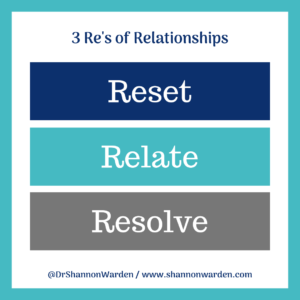The 3 Re’s of Relationships is a simple model I developed over time to help myself and my counseling clients work through difficult times with our children. The 3 Re’s are Reset, Relate, and Resolve:
Reset
When we’re upset with our children or simply don’t understand their viewpoint, parents, we should put ourselves in “time-out.” Whether 30 seconds, five minutes, or other limited time, we can use this time to organize our thoughts and reset. That is, rather than too quickly say unsupportive things or hurtful things we don’t mean, let’s take a breath (or maybe several). And, let’s practice the time-honored parenting technique of time-out to, yes, think about it! More specifically, we should reflect on things like:
- What are they feeling? Do they feel upset, misunderstood, angry, disappointed, out of control, etc.? Let’s name feelings such as these for ourselves. This way, we are better able to name those feelings and support our child when we return from our brief time-out.
- Why might they feel this way? Perhaps they feel wronged. Or, maybe they feel powerless. They may not know how to express themselves clearly or calmly. Equally possible, as humans do, they may not like that life is sometimes hard and hurtful.
- Remember that we, too, have felt these same feelings, and we, too, have needed understanding and support. No matter if it’s a case of disobedience, immaturity, or misunderstanding, we, too, have at one time or another been guilty of the same things. Our child may absolutely be guilty of overreacting or misbehaving, and reasonable consequences may be warranted. However, we don’t have to overreact or be irrational in our handling of the situation.
After this brief time-out, we should now be better able to take the next of the 3 Re’s of Relationships, which is…
Relate
Return to your child and say something like, “I’ve thought about this, and I want you to know, I get it. You’re disappointed. You think it should be totally different. I know how that feels, and it’s hard.” Then, allow them time and invite them to appropriately share their thoughts and feelings.
Obviously, you and I have to tweak our response based on our children’s ages and stages of development, but you get the point. It’s important for us to get our own thoughts and feelings under control and put ourselves in our child’s shoes. By doing that, we can better relate to them and respond with compassion. Relating and responding in this way helps adults and children alike feel understood and supported. Plus, it helps us to feel more connected, which in turn increases the odds of success for the third of the 3 Re’s of Relationships, which is…
Resolve
Notice your child’s reaction when you relate to them versus times when you have not related as well. Among possible reactions, he or she may calm down, and/or they may open up and share more thoughts and feelings. These are healthy responses that are made possible, in part, because you stayed calm and opened up your heart and mind to understand your child’s thoughts and feelings. Commit to staying in a “relate” mindset as best you can (take another time-out if you need to reset again). And, steadily work with your child to resolve the problem at hand. For example, you might say something like,
- “Honey, I know you’re mad and don’t feel like you’ve been treated fairly, but let’s talk some about how we can work through this issue.” Or,
- “I get your point, but we’re a family, and families work together. We have to respect each other’s space (or follow-through with chores, or speak kindly to one another, etc).” Or,
- “Your friend was unkind for sure. Let’s talk about how you might respond.”
Goals of the 3 Re’s
The scenarios will vary, but the main goal of the 3 Re’s is to make the most out of difficult parenting moments. We do this by working to understand our child’s side of things and demonstrating reasonable problem-solving for and with them. Why? So that they might increasingly master these same important relationship skills and life skills. Of course, our children are a lot like us and may not immediately accept our positive parenting. Nonetheless, we should stay the course. The more you and I reset, relate, and resolve…the more likely we are to experience more positive, productive outcomes in tough parenting moments and seasons. And, hopefully, our relationships with our children grow, as well as their ability to manage life’s many challenges, both the current challenges and the ones to come.
Share the 3 Re’s
Depending on their age and stage, tell your child that you’re practicing the 3 Re’s of Relationships, or just the 3 Re’s. Invite them to practice along with you so that everyone goes all-in on this home life improvement project. And, any time you or another family member implement the 3 Re’s, acknowledge and celebrate the effort. Little by little, I believe you and they will see positive results.
Thanks for reading! Comment below or find me on social media to share your thoughts!
Your DIY relationship coach and fellow DIY’er,
Shannon
PS: Check out mine and Dr. Gary Chapman’s newest book, The DIY Guide to Building a Family That Lasts, available at Amazon, Walmart, Sam’s Club, Barnes and Noble and other fine bookstores.
PS2: I’d love to have you sign up to receive my Hope to Build On blog. That way, any time I post a blog, you’ll receive it in your inbox.



Leave A Comment